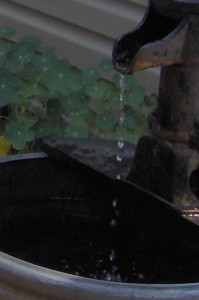Liturgy of the Palms | Matthew 21:1-11
Expectations. We all have them.
There was an entire crowd watching this man Jesus riding into Jerusalem. They came together just to see him, to line the road with soft tree branches and even with their own clothing. He was a rock star.
Another crowd was watching from inside the city, and they asked who this man was. It was a good question, seeing all the fuss.
This is the prophet Jesus from Nazareth in Galilee.
That is the answer the crowd by the road gave, according to Matthew’s gospel. (They didn’t actually have rock stars in the first century.) What they thought about him was less clear, perhaps even to them. They had expectations, though, that much is certain.
We have expectations of God—what God wants, what God is like, what God is doing, often of what God is going to do for us. When God doesn’t meet our expectations, we either blame ourselves as being unworthy or we blame God: guilt or disappointment. We seldom examine our actual expectations.
I might expect my dog to fetch my newspaper. Other people  have told me that dogs do that sort of thing. I’ve seen it happen in movies. In actuality, my Westie will jump onto the back of a chair by the window and watch me fetch the paper, or anything else that needs to be brought inside. He will, on occasion, fetch something from inside the house and take it outside, such as one of my shoes.
have told me that dogs do that sort of thing. I’ve seen it happen in movies. In actuality, my Westie will jump onto the back of a chair by the window and watch me fetch the paper, or anything else that needs to be brought inside. He will, on occasion, fetch something from inside the house and take it outside, such as one of my shoes.
The problem is my expectations. No one, meaning me, ever taught my dog to fetch the newspaper. In fact, I don’t even have a subscription to a newspaper. And if my dog ever went out unsupervised, I suspect that he would just keep going and send me a postcard from Hawaii. Imagining that my dog will fetch the paper is borderline mental deficiency.
We expect things of God. We might deny it, but on some level we expect God to look like the paintings, all robes and a white beard. In reality, God might look like some codger eating shrimp on a porch in Louisiana, or like a little girl with a shimmering rainbow balloon. God might decide to look like my dog, or like something we would not even recognize.
I imagine the last possibility is the most likely. God looks like something we would not recognize, perhaps do not recognize right now, right in front of us. God does things that we do not expect, in ways that do not meet our expectations.
The crowd thought that Jesus was a prophet, coming with the power of God to deliver them out of their problems. If we’ve got it right, Jesus actually was the power of God, and he did come with deliverance, just not the kind that anyone there had in mind. Maybe he wasn’t even bringing the kind that we have in mind.
When we explore the whole faith thing, we expect our lives to change, our problems to be solved, and our lives to become radically transformed, like in a movie. It doesn’t quite turn out that way, not for most of us, not most of the time.
We need to examine our expectations. Or, better, we need to get rid of our expectations altogether.
Don’t expect things about God, how God will look, what God will do, how God will react. That is mere religion, or superstition, or self delusion.
Faith just expects God.










